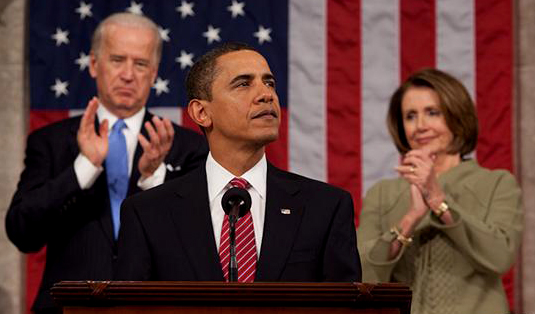Barack Obama and MSNBC have a lot in common. They are rich, sleek, and corporate-friendly. They staff their organizations with urbane meritocrats. Both institutions rely on a kind of soft-focus patriotism that stops shy of nationalism—an American-exceptionalist-lite rhetoric that takes refuge in hope and in appeals to “who we are,” among other superficial aspirational slogans.
Consequently, it’s no surprise that Obama meets with little criticism on MSNBC. The alignment isn’t merely political; it’s aesthetic, generational, and class-based. Reverence for Obama is by now the network’s stock-in-trade. It has never critically assessed his presidency.
Obama’s eulogy of late Georgia congressman and civil rights legend John Lewis “won the week,” according to MSNBC’s Midwin Charles: “President Obama was on fire.” “A powerful eulogy…a treatise on American democracy, a rousing call to arms,” said new anchor Joy Reid. Conservative anchor Joe Scarborough struck the same note, though with his usual pomposity: “Knowing John Lewis the way I did—and I knew him pretty damn well—Barack Obama did exactly what John Lewis would have wanted him to do in that funeral.”
The Obama brand is appealing, especially in comparison with the current president. Obama is everything that Trump is not: handsome, well read, reasonable-seeming, beautifully turned out; even today, the sight of Obama on television is enough to persuade people that things are still halfway okay.
Sadly, however, things are really not all that okay. I’d like to believe the highly artificialized vision of the world that television conjures up in order to seduce, titillate, and comfort the maximum number of people. But how well does the glossy, TV-friendly facade serve the needs of the network’s viewers?
Not very, according to former MSNBC producer Ariana Pekary, who quit her job some days ago in an apparent crisis of conscience. Pekary wrote a much-circulated blog post about her decision to quit the network in early August, calling the cable news obsession with ratings “a cancer” that stokes political division by amplifying the most outrageous voices. The ratings obsession risks lives, she said, by focusing on Trump’s failures in the pandemic, in preference to vital scientific and epidemiological news; it risks democracy itself, by allowing Trump’s excesses to dominate coverage, in preference to intelligent and serious discussion of the threats our society and our world are facing.
All of this is true, and worth thinking about, but MSNBC’s coverage demonstrates something subtler and farther-reaching still. Though Pekary was held up by right-wing media as a critic of MSNBC particularly, her concerns were economic, not ideological. “The flawed structure of the industry,” she said, “affects everyone.”
The contest is rhetorical, but the battlefield is commercial. Which means that rhetoric, ultimately, is just another form of marketing. During the Obama presidency, the fine talk was sometimes accompanied by clear, competent, and effective policy, as in 2014–16, when the Obama administration responded to the Ebola crisis by coordinating the state and federal response and spending hundreds of millions of dollars to send thousands of troops to West Africa to help contain the virus. Just two people in the US died of Ebola in that outbreak.
But sometimes Obama’s slogans accompanied less appealing news. He had been in office only a few months, for example, when he attempted to block the court-ordered release of photos showing the abuse of detainees by American soldiers. “The decision to not release the photographs makes a mockery of President Obama’s promise of transparency and accountability,” said ACLU attorney Amrit Singh, who had argued the case, which the ACLU fought for more than ten years.
MSNBC was not and is not about to call Obama out for having broken his campaign promises of transparency, for permitting nine million people to lose their homes in the mortgage crisis, for failing to jail even a single banker, or for having failed to call the butchers of Iraq to account.
There is no cable news station broadcasting today that is willing to state the blindingly obvious, to wit, that a less corrupt, less wealth-enslaved, less warmongering Democratic Party—a party that had paid more than lip service to the needs of working people over the previous eight years—would have walked away with the 2016 election. Maybe this begins to explain the strange coolness of Obama toward the candidacy of his own vice president.
Joe Scarborough and Nicolle Wallace, the network’s Lincoln Project Republicans, have made hay for years out of calling Trump a buffoon and a vulgarian, day after day, in a never-ending performance of self-satisfied indignation. Rachel Maddow and Joy Reid indulge in the same charade, from a slightly more left-inflected position.
Obama’s aloof, technocratic coldness makes for a great foil to all that outrage. He plays the role of the anti-Trump very well. But the outrage is simplistic; it’s pure theatrics. At a time of enormous danger, trauma, and grief, some of us just want to know what’s happening.
Maria Bustillos is the founding editor of Popula, an alternative news and culture magazine. Her work has appeared in the New York Times, The New Yorker, Harper’s, and The Guardian.


